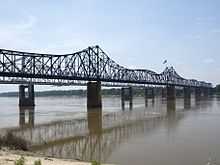Old Vicksburg Bridge
| Old Vicksburg Bridge | |
|---|---|
 Mississippi Railroad Bridge Vicksburg | |
| Coordinates | 32°18′52″N 90°54′17″W / 32.31444°N 90.90472°W |
| Carries | 1 Kansas City Southern rail line, one service lane |
| Crosses | Mississippi River |
| Locale | Delta, Louisiana and Vicksburg, Mississippi |
| Maintained by | Kansas City Southern Railway |
| Characteristics | |
| Design | Cantilever bridge |
| Total length | 8,546 feet (2,605 m) |
| Longest span | 825 feet (251 m) |
| Clearance below | 116 feet (35 m) |
| History | |
| Opened | May 1, 1930 |
|
Mississippi River Bridge | |
 | |
| Location | Spans Mississippi River on Old US 80, Vicksburg, Mississippi and Delta, Louisiana |
|---|---|
| Coordinates | 32°18′54″N 90°54′20″W / 32.31500°N 90.90556°WCoordinates: 32°18′54″N 90°54′20″W / 32.31500°N 90.90556°W |
| Built | 1928 |
| Architect | Vicksburg Bridge and Terminal Co. |
| Architectural style | Cantilevered truss span |
| Governing body | Local |
| MPS | Historic Bridges of Mississippi TR |
| NRHP Reference # | 88002423[1] |
| Added to NRHP | February 14, 1989 |
The Old Vicksburg Bridge, also known as Mississippi River Bridge, is a cantilever bridge carrying one rail line across the Mississippi River between Delta, Louisiana and Vicksburg, Mississippi.
It was listed on the National Register of Historic Places in 1989.[1]
Until 1998, the bridge was open to motor vehicles and carried US 80 across the Mississippi River, though one road lane runs through the bridge for inspection by workers.
During the period when the bridge was open to regular traffic, and before the construction of a new bridge a short distance down river from the existing one, a rather unique system of operation was in place to handle the through tractor-trailer truck traffic which used the bridge. Located at each end of the bridge, there were a pair of railroad styled signal towers, which required trucks to stop. Once stopped, the towers would close off traffic for all vehicles in both directions, and then allow trucks to cross the bridge alone, using the full width of both of the narrow lanes, as opposed to staying in just one lane. Due to numerous safety concerns, crossings by trucks were limited to day time only operation, with trucks being required to wait until dawn before being allowed on the bridge.
See also
References
- ↑ 1.0 1.1 "National Register Information System". National Register of Historic Places. National Park Service. 2009-03-13.
| |||||||||
| ||||||||||||||||||||||||||